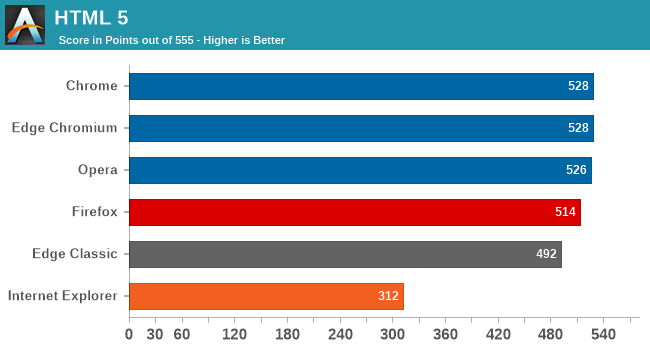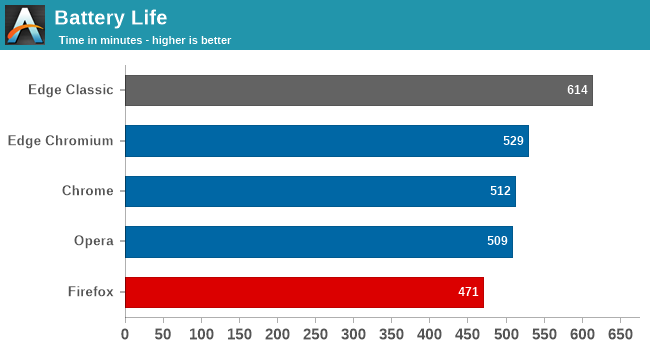The 2020 Browser Battle: Surfing With Speed
by Brett Howse on September 10, 2020 8:00 AM EST- Posted in
- Software
- Browsers
- Mozilla
- Google Chrome
- Microsoft Edge
HTML 5 Compatibility

Finally, to see how many HTML 5 features are supported by each browser, each one was run against http://html5test.com/ which compiles a score out of 555, with scoring being based on how many HTML5 specifications, popular draft standards, and WebGL, and IndexedDB / Web SQL. A higher score means the browser supports more of the tests, which in theory means that the browser should be more compatible with more websites, although that is certainly not always the case.
Web Browser Battery Life
It would be hard to argue with how pervasive and important the internet is, so “browsing the web” is a critical function for laptops. Gone are the days of browsing static content on Geocities and instead the web is now the home to critical business applications, communication, and of course, entertainment. Finding a few more minutes of battery life just by using a different browser might be the difference between getting through a workday, and not.
To see how each browser performed, the Surface Laptop 3 15-inch had the brightness dialed into 200 nits, and each browser was run through our quite demanding web workload until the system turned off, and then the test was repeated to ensure there were no anomalous results. All the browsers were tested at least twice, with the exception of Internet Explorer 11, which was not tested, because you should really not be using it.

One of the biggest questions going into this was what impact Microsoft would see moving from their EdgeHTML and Chakra based browser in the classic Edge, to the Chromium version. Microsoft touted their battery life significantly when Edge was the new browser on the block, and for good reason. As you can see, classic Edge provided significantly better battery life than any other browser used. When your pool of energy is a fixed size, squeezing out extra runtime is not a trivial undertaking, and Microsoft has certainly given up some battery life to provide a more compatible browser.
Looking at the Chromium based browsers, which are the new Edge, Chrome, and Opera, and they all more or less fall in the same range, with only twenty minutes of runtime between the three, but as we saw with the scripting tests, Edge was able to provide just a bit more battery life than the others.
Firefox, while competitive, is over thirty minutes behind its closest competitor. It is likely not enough of a difference to spur anyone from moving away from Firefox if they are happy with its other features, but the Mozilla team is not quite up to par in terms of energy use.










121 Comments
View All Comments
skavi - Thursday, September 10, 2020 - link
Thanks for making this! I'd love to see Safari included next time.casperes1996 - Thursday, September 10, 2020 - link
Whenever Big Sur is released I'd love a Mac version of this with the new Safari in the mix - It's one of basically 3 unique browsers left, and on my 2020 iMac it was faster than Chrome in every single test as well as using fewer system resources, and on my MacBook, gives better battery life with light usageOreoCookie - Thursday, September 10, 2020 - link
I was so excited to read this article — until I realized the author was going to exclude Safari. Given that there are three browser engines of relevance these days, Chromium, Gecko and WebKit, excluding the one that is in the #2 spot (since it is on all iOS devices) makes this article worth much less.Brett Howse - Friday, September 11, 2020 - link
It's tough to include Safari in an article where I want to see how Microsoft's move from EdgeHTML to Chromium went, when Safari is only on the Mac.OreoCookie - Saturday, September 12, 2020 - link
Why is that tough, I think it is really easy? Just use a Mac, install Boot Camp on it and make it dual boot Windows. You then have a perfectly fair way to test all browsers natively. It'd also be interesting to see if there are any speed differences between the OSes. And since you are not benchmarking hardware, any Mac will do.Lord of the Bored - Sunday, September 13, 2020 - link
Because the underlying OS is a factor. You simply can't compare Safari on OSX to Edge on WinX. It is a meaningless metric.Hell, you can't even compare Chromium Edge on WinX to Old Edge on a diffrent WinX service pack.
OreoCookie - Monday, September 14, 2020 - link
Chrome and Edge run perfectly fine on my Mac. So you could account for differences in the OS.casperes1996 - Sunday, September 13, 2020 - link
Understandable, and with the focus on Edge going Chromium for this article that's a sensible choice. - But for a future article with the focus shifted more onto the nature of what is essentially a three horse race in the browser space, I'd love to see some numbers behind Safari's impressive speed and battery life, though comparatively lacking feature setOreoCookie - Sunday, September 13, 2020 - link
Regarding feature set, AFAIK the main reason for Safari “lagging behind” is security and that Apple and Google have fundamentally different opinions about how HTML5 should evolve. Google is prioritizing features that allow for richer web apps. But these features could become liabilities as far as privacy and security is concerned. And they could become battery life hogs. And Apple thinks native apps are better than web apps, and making HTML5 into an app platform would be worse for HTML5 and the consumers.Personally, I agree with Apple here, I hate web apps and apps that are mere HTML wrappers. The user experience is very lackluster and performance nowhere near as good. Websites that could be super simple already require me to download megabytes to view read an article that is a few kB in size.
Independently on how you feel about that, a browser review that leaves out the #2 engine seems like it is missing the mark.
asmian - Thursday, September 10, 2020 - link
It would have been interesting to see some significant and by now completely different forked versions like Pale Moon included to see how the debloating of Firefox code and a different rendering engine affects results.